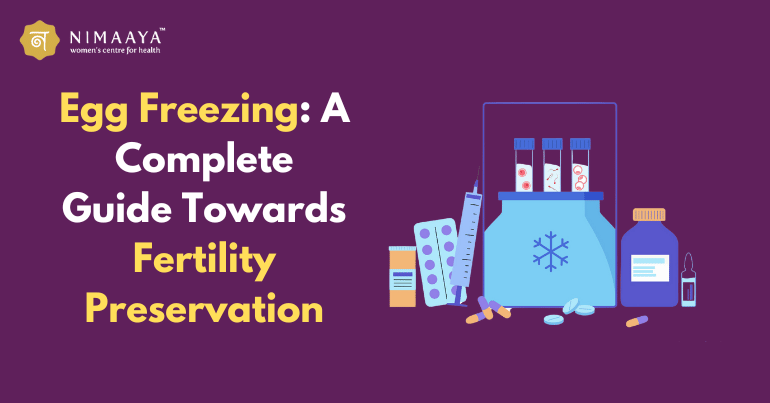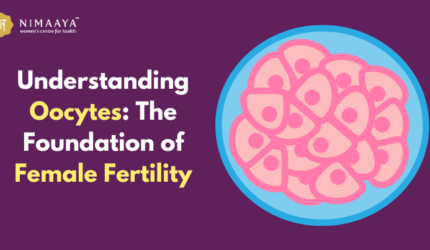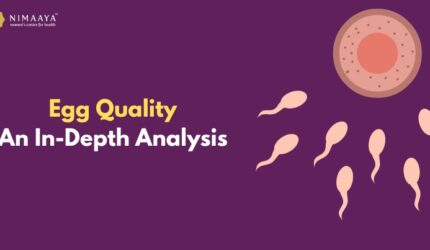Egg freezing enables individuals to preserve their ability to conceive a child biologically in the future, whenever they choose.
The option is chosen nowadays because it involves minimum risk and maximum chances of success rate. However, the rate of successful pregnancy is higher at younger ages of women as compared to egg freezing or other fertility treatments.
In this blog, we will conduct an in-depth study on reasons why individuals might consider egg freezing treatment as a viable option.
Let’s study in depth!
What is Egg Freezing?
Egg freezing, also known as oocyte cryopreservation, is a method used to preserve eggs for future use. This option is often chosen by women who are not ready to start a family in the present but wish to conceive a baby at a later stage in their life. The reason for this choice often revolves around a woman’s career focus or a mutual decision by a couple to delay having a child.
The process begins by harvesting eggs from the women’s ovaries, preserving them in a frozen, unfertilized state, and storing them for future use. Subsequently, the thawed eggs can be fertilized with sperm in a laboratory and then implanted in the woman’s uterus.
There are two methods:
Natural vs Stimulated Cycle
-
Natural Cycle
During a woman’s natural ovulation cycle, the hormone follicle stimulating hormone (FSH) prompts the growth of follicles, which results in the release of a single egg. Within a week or later, maybe, the body emits another hormone, luteinizing hormone, that instructs these follicles to release the egg. During the natural cycle, the ovary will release a single egg that will ultimately travel down the fallopian tube to either be fertilized or realized. The significant advantage of this natural process is that there are no egg-freezing side effects.
-
Stimulated Cycle
In the case of IVF and egg freezing, the ovaries are stimulated to release more eggs than the single egg produced. During a stimulated cycle, women will inject themselves hormones called gonadotropins to encourage follicle growth, aiming to retrieve multiple eggs.
During this particular period, you need to visit an IVF center, where you can monitor follicle growth, monitor hormone levels, and make required dosage adjustments.
Process of Egg Freezing
Ovulation Induction
Ovulation Induction, the process begins with ovarian stimulation for egg freezing. Over approximately 10-12 days, hormonal medications are administered to stimulate the ovaries. The goal is to ensure that ovaries produce multiple eggs instead of a single egg during a natural menstrual cycle.
These medications facilitate the simultaneous maturation of multiple eggs.
Also Read: Ovulation Induction: A Comprehensive Guide to Stimulating Ovulation for Fertility
Monitoring and Hormonal Stimulation Adjustment
During this stage, the progress of ovarian follicle development is monitored using ultrasound and blood tests to check hormone levels. Dosage adjustments are made based on the progress of follicle growth. Once the follicles have matured and are prepared for ovulation, a final injection is administered to help the eggs reach the stage of maturity.
Egg Retrieval
After 36 hours of the trigger shot, the egg retrieval procedure is conducted. This minimally invasive surgical procedure is performed under light anesthesia. During this process, an ultrasound is used internally to identify follicles in the vagina.
Egg Freezing
Once the retrieval of unfertilized eggs is retrieved, they undergo immediate evaluation, and viable ones are preserved through a process called vitrification. Vitrification involves rapidly cooling the eggs to an extremely low temperature using nitrogen. The frozen eggs(Egg Freezing) are stored in specialized cryogenic containers until they are ready for future post-thaw survival and fertilization
Purpose of Egg Freezing
Preservation of Fertility
Preserving fertility through egg freezing enables individuals to store eggs for potential future use, which is particularly beneficial for those undergoing medical treatments like chemotherapy or radiation that can impact fertility. Additionally, individuals who choose to delay starting a family due to professional or personal reasons find freezing advantageous.
Empowerment of Family Planning
With increased education and awareness around family planning, couples now have greater control over their reproductive choices. With a higher success rate, women concerned with declining egg count but not yet ready for children can opt for freezing, enhancing their chances of conceiving later in life.
Career or Educational Pursuits
Some couples are at the peak of their career and opt to postpone having children. For them, egg freezing provides the best option for biological children while allowing them to prioritize their current pursuits, leading to long-term advantages.
Family History of Menopause
In families with a history of early menopause, individuals often have two choices. The first one is to get pregnant at an earlier stage, while the second entails freezing eggs for future use so that you can choose or have a chance to conceive a baby at a later stage of your life.
Couples usually choose the second option because of their lifestyle and the desire to get a baby whenever they wish to. They currently focus on their career or other important things that matter to them.
Also Read: मेनोपॉज म्हणजे काय (Menopause meaning in Marathi): लक्षणे, आणि उपचार
Benefits of the Egg Freezing
Improving IVF Success Rate
Using frozen eggs in the IVF procedure sometimes results in a higher egg freezing success rate as compared to using fresh eggs. This particularly benefits individuals who undergo IVF due to infertility issues or those preserving eggs for future use.
Also Read: Decoding Parenthood: Unveiling the IVF Success Rates in India
Peace of Mind
The women are at ease in focusing their attention on things that are crucial for them at a given moment and planning to have a baby when they feel mentally and physically prepared to take on the responsibility.
Reduces Fertility Anxiety
During the journey of planning a baby, females go more through the mental and emotional aspects of egg freezing compared to males. They may feel stressed and anxious when faced with the potential disruption of their professional lives for having a child. On the other hand, egg freezing provides control over fertility decisions, empowering women to pursue their goals and make the decision about conceiving when they wish to.
Consideration of Individuals and Couples for Fertility Preservation
Individual consideration
-
Medical History
Personal and medical history plays a very crucial role while considering conditions impacting fertility or treatments that might pose a risk to fertility can prompt consideration of egg freezing.
-
Age
Younger individuals tend to have better egg quality and quantity, making it an optimal time for egg freezing within the recommended egg freezing age limit.
-
Lifestyle Consideration
Personal and professional factors such as career, education, or travel plans will definitely influence the timing of family planning. In this condition, egg freezing offers flexibility for couples to choose when to start a family.
Couple Consideration
-
Fertility Challenges
Couples facing fertility challenges due to male or female factors may consider fertility treatments to realize their parenting dreams.
-
Family Planning
Egg freezing can be part of a family planning strategy, allowing for postponing parenthood with minimal risks involved. For e.g., If you’re not ready for children for the upcoming 5 years and want to plan after a few years then this option is perfect because it involves minimum risk involved.
-
Supporting Each Other
In cases where one of the couples isn’t mentally prepared for parenthood, mutual decisions to delay parenthood and opt for fertility treatment can be beneficial.
Risk or Side Effects of Egg Freezing
While generally, egg freezing is considered safe, may lead to minor side effects like pelvic infection, bloating, constipation, nausea from the medication, and egg retrieval.
As we saw, there is no such major risk involved during the egg freezing process, but at the same time, there are side effects of egg freezing. Let’s explore it one by one:
- Allergic reactions such as skin reddening or itching.
- Breast tenderness and increased vaginal discharge
- Mood swings and fatigue
The biggest risk to ovulation induction is ovarian hyperstimulation stimulation (OHS) which is a serious complication and has a higher chance of occurrence because of the medication used.
Summing it up
We hope you got insights into how egg freezing is considered a risk-free option compared to other fertility treatments. Throughout this, we took you through the benefits, risks, purposes, and processes involved in guiding couples and individuals in the considerations to be taken before they opt for freezing eggs as their preferred fertility treatment for conceiving a baby.
By covering both the benefits and side effects of the same, we covered egg freezing advantages and disadvantages that will indirectly help you in choosing the particular treatment.
At Nimaaya IVF Center, we make sure that infertility treatment can be chosen by parents and individuals who are seeking to have children but cannot because of genetics, male or female illness, or any other reason.




Comments 1
Very informative and useful blog, keep sharing.